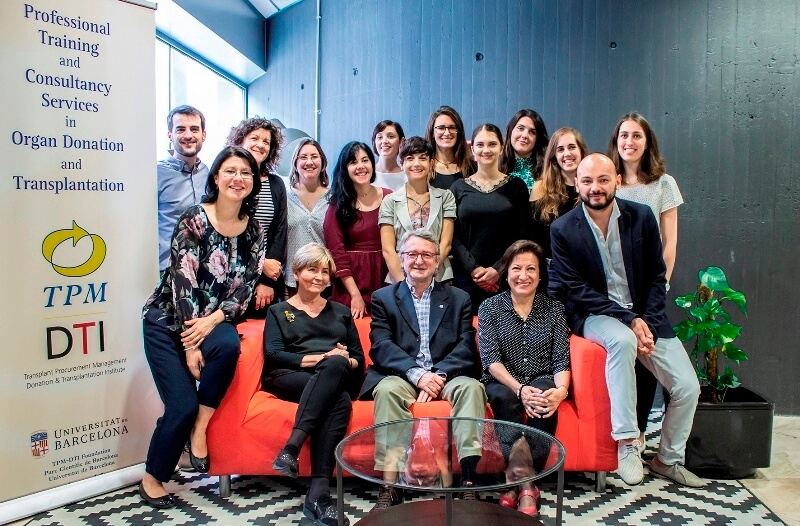
DTI Foundation: A decade promoting research and training in donation and transplant
Yesterday, DTI Foundation (Donation &Transplantation Institute) celebrated its 10th anniversary at Barcelona Science Park. The Foundation —created in Barcelona in 2008— was conceived with the aim of providing consultancy, training and support to professionals from public and private organisations in creating, developing and strengthening networks, programmes and services in the area of organ, tissue and human cell donation and transplantation worldwide. Since its formation, the organization has trained over 14,000 healthcare professionals in the area of organ and tissue donation and transplantation in over 100 countries worldwide.
The opening ceremony, attended by over 100 people, was presided by Dr Martí Manyalich, president of DTI Foundation, with the participation of Dr Jaume Tort, Director of the Catalan Transplant Organisation (OCATT); Dr Francesc Cardellach, dean of the Faculty of Medicine at University of Barcelona (UB); Dr Beatriz Domínguez, director of the National Transplant Organisation (ONT); and Ignasi Belda, CEO of Barcelona Science Park.
The event also included a presentation of DTI Community project and other current activities, and Dr Manyalich was awarded with the honorary distinction of ‘Hippocratic Physician’ by the Hippocratic Movement of the Island of Kos (Greece). This award is given to doctors who have proven to possess two qualities that are key to the art of medicine: scientific excellence and dedication to humankind.
“Saving people’s lives by recovering organs that can function in their bodies a few hours after transplantation is extraordinary. Thanks to the Spanish transplant model, we have been world leaders for the past 25 years. In Spain, people show a lot of solidarity—in 2017 the ONT registered almost 47 donors per million population, while the European average is 18 donors per million. The reason for this is not a matter of cultural or religious differences, nor a lack of awareness—it’s the system. In Spain, people trust the system. In Spanish hospitals, there are doctors dedicated exclusively to donation and transplantation who know what to do when life comes to an end and how to organise the entire process, and this is what allows the model to work”, explains Dr Manyalich.
Over 14,000 professionals in more than 100 countries around the world
Through its TPM (Transplant Procurement Management) programme, DTI Foundation currently encompasses a large number of professionals in Spain, Europe and America specialised in the donation and transplant process. Since its creation, TPM has trained over 14,000 healthcare professionals in the area of organ and tissue donation and transplantation in over 100 countries around the world.
The Foundation’s most important projects over this past decade include: the EMPODaT programme (2013-2015), the aim of which was to improve organ donation and transplantation in Egypt, Lebanon and Morocco, by training healthcare professionals in this field through a Postgraduate Degree in Organ Donation and Transplantation; the KeTLOD project (2016-2018), co-financed by the European Commission within the Erasmus+ programme, with the basic aim of designing and launching a postgraduate course in organ donation adapted to the needs of Chinese healthcare professionals, to strengthen collaboration with China; the Seeding Life programme (2015-2018), to improve professional knowledge, skills and competences in the area of organ donation and transplantation in Bulgaria and Latvia; and the EUDONORGAN project (2016-2019)—led jointly by DTI Foundation, the University of Barcelona and the Bosch i Gimpera Foundation—which aims to make an active contribution to increasing organ donation rates in Europe and neighbouring countries, focusing on two main principles: training and social awareness.
Only 10% of the world population has access to transplants
The Global Observatory on Donation and Transplantation (GODT) –which has been managed by the National Transplant Organisation (ONT) for the past 10 years, together with the World Health Organisation (WHO)– places the total number of organ transplants across the world in 2016 at 126,670, showing the highest ever year-on-year increase of 5.8%. However, both WHO and ONT estimate that these figures represent just 10% of the actual global transplantation needs.
Meanwhile, the figures also show that Spain is more firmly consolidated than ever as the leading country in this field. With 2,019 donors, it provides 18.5% of donations within the European Union and 6.6% of registered donations worldwide (30,557). Transplant rates are increasing in countries such as Portugal, Italy, the UK, Australia and Canada, which have adopted the Spanish transplant model or at least some of its aspects.
Data taken from ‘Newsletter Transplant 2017’—an official publication of the Council of Europe’s Committee on Organ Transplantation, published by the ONT— the only source of official information on the data collected by GODT: http://www.ont.es/publicaciones/Documents/NEWSLETTER%202017_baja%20(2).pdf




